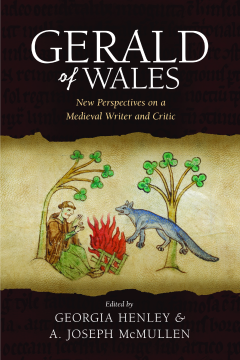
Additional Information
Book Details
Abstract
Gerald of Wales (c.1146–c.1223), widely recognized for his innovative ethnographic studies of Ireland and Wales, was in fact the author of some twenty-three works which touch upon many aspects of twelfth-century life. Despite their valuable insights, these works have been vastly understudied. This collection of essays reassesses Gerald’s importance as a medieval Latin writer and rhetorician by focusing on his lesser-known works and providing a fuller context for his more popular writings. This broader view of his corpus brings to light new evidence for his rhetorical strategies, political positioning and usage of source material, and attests to the breadth and depth of his collected works.
Table of Contents
| Section Title | Page | Action | Price |
|---|---|---|---|
| Cover | Front Cover | ||
| Title Page | iii | ||
| Copyright Page | iv | ||
| Contents | v | ||
| Acknowledgements | vii | ||
| Abbreviations | ix | ||
| Illustrations | xi | ||
| Notes on\rContributors | xiii | ||
| Chapter One: Gerald of Wales: Interpretation and Innovation in Medieval\rBritain | 1 | ||
| Section\rOne: Appropriating the Past | 17 | ||
| Chapter Two: Gerald of Wales and the Welsh Past | 19 | ||
| Chapter Three: Gerald and Welsh Genealogical\rLearning | 47 | ||
| Chapter\rFour: Gerald of Wales, Walter Map and the Anglo-Saxon History of Lydbury North | 63 | ||
| Section Two: Gerald the Writer:\rManuscripts and Authorship | 79 | ||
| Chapter Five: Gerald of Wales and the History of Llanthony\rPriory | 81 | ||
| Chapter Six: The Early Manuscripts of Gerald of Wales | 97 | ||
| Chapter\rSeven: Giraldian Beavers: Revision and the Making of Meaning in Gerald’s Early Works | 111 | ||
| Chapter Eight: Style, Truth and Irony: Listening to the Voice of Gerald of\rWales’s Writings | 127 | ||
| Section\rThree: Gerald the Thinker: Religion and Worldview | 145 | ||
| Chapter Nine: Gerald of Wales’s\rSense of Humour | 147 | ||
| Chapter Ten: Fere tirannicus: Royal Tyranny and the Construction of Episcopal Sanctity in Gerald of Wales’s Vita Sancti\rHugonis | 165 | ||
| Chapter\rEleven: ‘A Priest Is Not a Free Person’: Condemning Clerical Sins and Upholding Higher Moral Standards in the Gemma ecclesiastica | 183 | ||
| Chapter Twelve: Elements of Identity: Gerald, the Humours and National Characteristics | 203 | ||
| Section Four:\rReception in England, Ireland and Wales | 221 | ||
| Chapter Thirteen: Gerald’s Circulation\rand Reception in Wales: The Case of Claddedigaeth Arthur | 223 | ||
| Chapter\rFourteen: The Transmission of the Expugnatio Hibernica in Fifteenth-century Ireland | 243 | ||
| Chapter\rFifteen: Did the Tudors Read Giraldus? Gerald of Wales and Early Modern Polemical Historiography | 259 | ||
| Afterword | 283 | ||
| Bibliography | 285 | ||
| Index | 313 | ||
| Back Cover | Back Cover |
